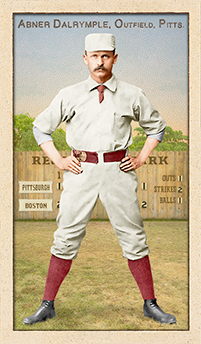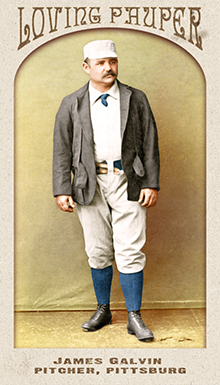
- Series: 1880s: Loving Paupers
- City: Pittsburgh
- Team: Alleghenys
- League: National League
- Hall: National Baseball Hall of Fame
James Francis Galvin (1856-1902) sported some colorful nicknames: Pud, Gentle Jeems and The Little Steam Engine, indicative of his renown. Pud was baseball’s first 300-game winner. He pitched for six teams over 15 years, and remains the only player to win 20+ games in ten seasons and not win a pennant. Only Cy Young pitched more innings or hurled more complete games, a testimony to the extraordinary demands placed on starters in the 19th century. Perhaps no pitcher of any era accomplished so much by overcoming a distinct physical limitation. In Galvin’s case, it was his small hands which left him unable to completely grip a baseball. He couldn’t throw the curve so he adapted, becoming an expert in “drops, straight balls and the different artifices known to pitchers to deceive the batter” as he told a friend. As his steam engine nickname suggests, Pud just rolled right at the hitter with power and durability yet with amazing finesse, especially in holding runners on base. Buck Ewing was a great admirer and said he wouldn’t have had anyone attempting steals with Galvin on the mound.
- Galvin threw no-hitters in 1880 and ‘84
- Began and ended his long career in St Louis with the NA’s Brown Stockings and NL’s Browns
- Elected to Hall of Fame: 1965
Auction History
Cartophilia
Old Judge Pose: 177-2
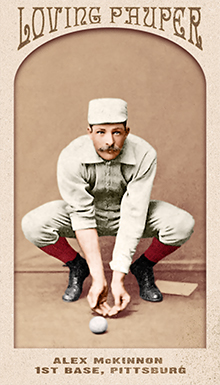
- Series: 1880s: Loving Paupers
- City: Pittsburgh
- Team: Alleghenys
- League: National League
Alexander J. McKinnon (1856-1887) was a remarkably talented player who was cut down in his prime by a scourge of the 19th century, typhoid fever. The tragedy was even more poignant inasmuch as McKinnon had endured numerous illnesses in his youth that had prevented him from really beginning what was on its way to a very fine career. As if sickness wasn't enough of a hardship for young Alex, he was also hindered in the beginning of his pro tenure by league politics and evolving contractual arrangements. He had begun playing for the Syracuse Stars in 1877, staying in NY with Albany/Rochester for the '79 season before heading west to the San Francisco Athletics of the California League in 1880. This move was precipitated by a squabble that involved William Hulbert of the new National League. Alex was assigned to the Troy Trojans for the 1879 season, but wanted to play for Rochester of the International League. Despite some back-room dealings that should have cleared up the controversy, Hulbert expelled McKinnon. A combination of illness that plagued him lifelong and this contract dispute seems to have led him to make the move west and then drop out of baseball altogether for a few years. Clearly McKinnon's talent was recognized and Hulbert relented, allowing Alex to be signed for the '83 season by the Philadelphia Quakers - but the young man was too sick to play. Finally, in 1884, the New York Gothams (not yet the Giants) signed Alex and he began a belated major league tenure that showed tremendous promise. Indeed, in the four short years he played for three NL teams - NY, St. Louis and Pittsburgh - Alex steadily improved his batting average. He hit .272 for the Gothams, jumped to .294 and .301 with the Maroons and was hitting a stunning .365 in 1887 when he was stricken with an ailment he couldn't lick, typhoid. After his mid-season death, the Alleghenys honored Alex by donning black crepe for the duration of that campaign.
- McKinnon was not just a good and ever-improving batter, he became a star in the field. He led the NL in fielding percentage in 1885 with a .978 record. This was all the more striking given his difficulty at first base for the Gothams the prior year when he made 53 errors. Clearly this star-in-training was a quick study
Auction History
Cartophilia
Old Judge Pose: 315-1
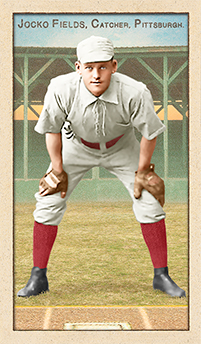
- Series: Beginnings: 1880's
- City: Pittsburgh
- Team: Alleghenys
- League: National League
John Joseph Fields (1864-1950) was named, by Hight Heat Stats, the starting left fielder for the All Emerald Isle Nine. This is, perhaps, less a tribute to Jocko than a commentary on the endeavors of Irish immigrants of the 19th century, who may have had more mundane occupations as they settled into their adopted land. Nevertheless, the list puts Fields in good company with Tommy Bond, Tony Mullane and Jack Doyle among the squad. Jocko was mostly a part-timer in the majors, starting with Pittsburgh's Alleghenys in 1887 where he played two more seasons. The uproar of labor strife in 1890 led to the Players' League founding and Fields tried his luck with the Burghers. Despite being led by Jake Beckley's formidable bat, the rest of the team didn't give much support and they languished in sixth place. Fields did have a decent year, hitting .281, well below his previous season's output when he hit .311. The PL did offer youngsters like Jocko more playing time, however, and he saw more action in '90 than any other campaign. He got into 126 games and drove in 86, nearly half of his six-year career total. He returned to the Pirates in '91 and was shipped to Philadelphia for a handful of games at the end of that season. A final try with the Giants in '92 lasted only 21 games and proved his swan song. Jocko's pro career had begun with the Jersey City Skeeters in 1885 followed by three NY teams in '86 before the Alleghenys called. He stayed in the game through the 1896 season for such teams as the Macon Hornets, Charleston Seagulls and Evansville Black Birds. He split his final tour between the Atlanta Crackers and Norfolk Braves. If nothing else, baseball provided a way for a young immigrant lad to really see the country.
- Fields' last few years in the minors saw him hit as well as he ever had. He averaged .351 for Charleston, and a combined .326 for those last two clubs in '96
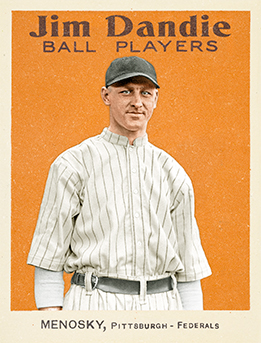
- Series: Jim Dandie Feds
- City: Pittsburgh
- Team: Rebels
- League: Federal League
Michael William Menosky (1894-1983) earned the nickname “Leaping Mike” for his abilities in the outfield and had some fine years at the plate, particularly for the Red Sox, in his nine-year tenure in the majors. He got his chance with the Pittsburgh Rebels of the Federal League in 1914. The team was aptly named, being one of the “outlaw” clubs that vied with the two established circuits for two years. The Rebels had come into the league as the Stogies, the old Union Association team in the Steel City. In its 1912 incarnation, the club was known as the Filipinos, reflecting not a heretofore unknown Asian connection to baseball, but in honor of its manager Deacon Phillippe. Ah, the romance of the early game! Menosky put up very average numbers in Pittsburgh and then with the Senators, a stint interrupted in 1918 by the war in Europe. He came into his own with Boston where he finished his career from 1920-23. His first three years in Fenway saw Mike bat .297/.300/.283 playing as a regular. His final campaign saw a marked drop-off in offense as he slumped to .229 in only 84 games. These seasons in Beantown pumped up his lifetime batting average to a solid .278. Menosky had speed, witnessed by his 10 triples and 22 steals for Washington in 1917 and the 23 stolen bases for Boston in 1920 that ranked fourth in the AL. He was the Sox' regular left fielder his first two seasons and opened in center in 1922, but only played four games there. Boston released the veteran after the '23 season and Mike went west to play for the PCL's Vernon (southeast Los Angeles) team.
- Menosky became a probation officer after leaving baseball. He played an interesting “expert witness” role in a criminal case involving a defendant charged with hurling a rock through a Detroit railroad terminal window. When the judge was skeptical that the man had the arm for that misdeed, he called Mike to demonstrate what a major league outfielder could do. When Menosky failed to throw the missile the 250 feet required to reach the window, the judge dismissed the case, reasoning that if Mike couldn't do it, the poor suspect couldn't have either
- Series: Beginnings: 1880's
- City: Pittsburgh
- Team: Alleghenys
- League: National League
Abner Dalrymple (1857-1939) was one of the most prolific hitters of the fledgling NL. He was the leadoff batter for 8 straight years (with 5 pennants) for the Chicago White Stockings, contributing to a team home run record in 1884 that stood until eclipsed by the ’27 Bronx Bombers. He hit over .300 six times.
- Still shares a record for 4 doubles in 4 at-bats, July 3, 1883
- A.G. Spalding paid $2500 (!) to get Dalrymple from the Milwaukee Grays in 1878
- Dalrymple earned that confidence, winning the NL batting title in his rookie year
- In 1881 became first ever batter to be intentionally walked with bases loaded
- Dalrymple's uniform color in this card was changed from blue to red in August, 2017 to reflect recent reliable research conducted by Craig Brown and friends at Threads of Our Game. Two cards were previously released featuring a blue uniform




